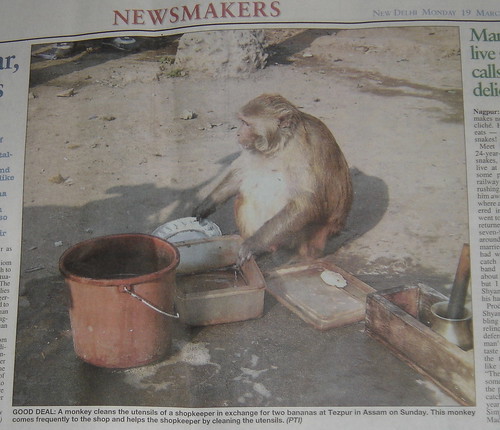Monkey Washing in Assam

Despite the important-sounding name, the Asian Age is a low-rent newspaper, as you can see by what they chose to include on the top half of their "Newsmakers" page (19 March edition). The caption reads: "GOOD DEAL: A monkey cleans the utensils of a shopkeeper in exchange for two bananas at Tezpur in Assam on Sunday. This monkey comes frequently to the shop and helps the shopkeeper by cleaning the utensils."
The hell? How is this at all likely? What do they mean "frequently"? And what do they mean by "clean"? Most monkeys I've seen make things dirtier than before. On the other hand, this monkey looks especially obese, so maybe it's remotely possible that he's given up his happy wild life of terrorizing anything he thinks is weaker than him and instead decided to work for bananas rather than steal them. But I just don't think so.
What gets me is that surely almost everyone reading this Indian paper has had at least some interaction with monkeys -- enough to know that they're cute at a distance and evil up close, with large teeth and an inclination to steal anything that looks interesting (just like this blog?). It's no more likely that monkeys would start cleaning things than that people would spend their days walking along each other's balconies, stealing water bottles, and mating on roofs.
For a more realistic approach to monkeyshines, I think you only have to look at the inside of the door leading to our balcony at the cheapo hotel we stayed at:

No comments:
Post a Comment